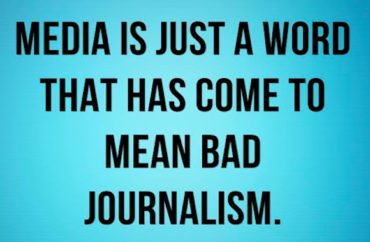
‘What hope can we have if police are publicly drawing guns on Black people on our own campus in the night?’
The Stanford University student paper The Stanford Daily apparently is taking to heart an Arizona State University professor’s recommendation — that newsrooms move away from objectivity.
A recent “news” article in The Daily highlighted an anti-cop graduate student’s account of a white cops-black suspect police encounter in which one cop drew his gun.
Jessica Stovall, a student in the Graduate School of Education’s Race, Inequality and Language in Education program, told the paper. “I refuse to watch public lynchings. I didn’t watch George Floyd. I will not watch Mr. Nichols. I already carry so much pain that I don’t need to witness and spectate a lynching.”
Stovall (pictured) tweeted out her version of the incident on Sunday.
“I talked to campus services on the phone,” read one tweet. “The Black man was released, and he started cussing out the officers, all of them white and looking dazed, especially the one who aimed his gun at him. I have never heard b**ch used so much and so appropriately.”
Stovall said she tried to “check on” the driver, but he took off before she got to the car.
 “I can’t help but think of all those with their cell phones out, waiting to see if they were to spectate the next public lynching,” she wrote. “Would they walk away thinking that the man was guilty? Would they wonder if he made it safely home to his loved ones?”
“I can’t help but think of all those with their cell phones out, waiting to see if they were to spectate the next public lynching,” she wrote. “Would they walk away thinking that the man was guilty? Would they wonder if he made it safely home to his loved ones?”
But … what exactly transpired? Why did the police officer draw his weapon?
Readers need to scroll down a bit in the “news” story to get the Stanford Department of Public Safety’s account.
According to the department, the police officer approached a man seated in a parked car (in the lot of a student residence) whereupon he noticed several “delivery packages” in the vehicle. The driver said he was a deliveryman and asked if he could leave — which the police reportedly allowed him to do.
MORE: Stanford Daily refuses to run College Republican’s op-ed, accuses it of ‘anti-blackness’
However, since there had been “recent concerns about package thefts on campus,” the cops ran the car’s license plate. They discovered the car’s owner had an outstanding DUI arrest warrant. As such, the police halted the car and ordered the driver to exit the vehicle. He did not comply. This was when one of the officers took out his gun and pointed it in the direction of the driver.
The driver then exited the car, whereupon he was put in handcuffs. The driver ended up not being the person wanted on the warrant and was released.
And here’s an interesting fact: Stovall, a soon-to-be-professor of African American Studies at U. Wisconsin-Madison, “confirmed most of Stanford’s account of the night.”
In response to Stanford’s message of “sadness, care and hope” regarding the Memphis, Tennessee killing of Tyre Nichols, Stovall said “But what hope can we have if police are publicly drawing guns on Black people on our own campus in the night?”
Her concluding tweet included the hashtag “#AbolishThe Police”:
I refuse to normalize this type of behavior of cops. This man was never arrested, and yet, he had a gun drawn on him. Police interactions like this cannot go quietly into that dark night. This is the work, and we got work to do. #AbolishThePolice
— Jessica Stovall (@_jessicastovall) January 29, 2023
Stanford professor Hakeem Jefferson, who believes 2020 election “conspiracies” and the January 6 “insurrection” are about “protecting a racist order” and that whites’ resistance to wearing face masks is “crazy,” also chimed in on the incident:
[Jefferson] felt “grateful” that he did not have to bear witness to this encounter, which is all too common for “so many people who happen to be Black or brown in this country.”
Jefferson noted that racial and class-based stereotypes often heighten suspicions like the ones that reportedly led to officers stopping the driver in the first place.
“It is hard to justify the almost default setting of an escalation that attaches to the holstering of a weapon,” Jefferson said. “Having great knowledge of the history and the way these things manifest, it is often the case that this escalation is at least unwarranted and too close to doing great harm.”
According to her personal website, Stovall taught high school for 11 years near Chicago and is an antiracist educational consultant. Her current research project is a “longitudinal examination of how Black teachers co-create a Black teacher fugitive space, and how this space informs and supports their pedagogies and navigation of antiblackness at their school sites.”
IMAGES: Duncan Brookwell, Jessica Stovall/Twitter screencaps
Like The College Fix on Facebook / Follow us on Twitter






Please join the conversation about our stories on Facebook, Twitter, Instagram, Reddit, MeWe, Rumble, Gab, Minds and Gettr.